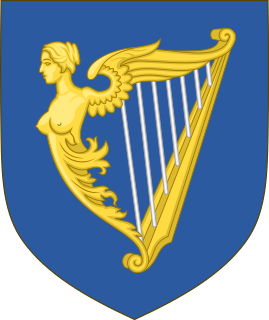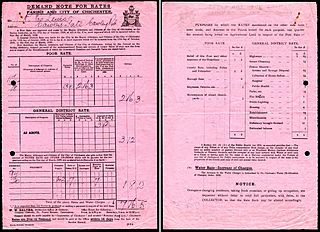
The English Poor Laws were a system of poor relief which existed in England and Wales that developed out of late-medieval and Tudor-era laws being codified in 1587–98. The Poor Law system was in existence until the emergence of the modern welfare state after the Second World War.

The Irish House of Lords was the upper house of the Parliament of Ireland that existed from medieval times until 1800. It was also the final court of appeal of the Kingdom of Ireland.

The Poor Relief Act 1662 was an Act of the Cavalier Parliament of England. It was an Act for the Better Relief of the Poor of this Kingdom and is also known as the Settlement Act or, more honestly, the Settlement and Removal Act. The purpose of the Act was to establish the parish to which a person belonged, and hence clarify which parish was responsible for him should he become in need of Poor Relief. This was the first occasion when a document proving domicile became statutory: these were called "settlement certificates".
In England and Wales, an extra-parochial area, extra-parochial place or extra-parochial district was a geographically defined area considered to be outside any ecclesiastical or civil parish. Anomalies in the parochial system, they had no church or clergymen and were therefore exempt from payment of poor or church rates and usually tithes. They were formed for a variety of reasons, often because an area was unpopulated or unsuitable for agriculture, but also around institutions and buildings or natural resources. Extra-parochial areas caused considerable problems when they became inhabited as they did not provide religious facilities, local governance or provide for the relief of the poor. Their status was often ambiguous and there was demand for extra-parochial areas to operate more like parishes. Following the introduction of the New Poor Law, extra-parochial areas were effectively made civil parishes by the Extra-Parochial Places Act 1857 and were eliminated by the Poor Law Amendment Act 1868. This was achieved either by being integrated with a neighbouring or surrounding parish, or by becoming a separate civil parish if the population was high enough.
The Patriot Parliament is the name given to the Irish Parliament called by James II during the 1689 to 1691 war in Ireland. The first since 1666, it held only one session, from 7 May 1689 to 20 July 1689.

The Poor Relief Act 1601 was an Act of the Parliament of England. The Act for the Relief of the Poor 1601, popularly known as the Elizabethan Poor Law, "43rd Elizabeth" or the Old Poor Law was passed in 1601 and created a poor law system for England and Wales.

In English and British history, poor relief refers to government and ecclesiastical action to relieve poverty. Over the centuries various authorities have needed to decide whose poverty deserves relief and also who should bear the cost of helping the poor. Alongside ever-changing attitudes towards poverty, many methods have been attempted to answer these questions. Since the early 16th century legislation on poverty enacted by the English Parliament, poor relief has developed from being little more than a systematic means of punishment into a complex system of government-funded support and protection, especially following the creation in the 1940s of the welfare state.

In England and Wales the poor rate was a tax on property levied in each parish, which was used to provide poor relief. It was collected under both the Old Poor Law and the New Poor Law. It was absorbed into 'general rate' local taxation in the 1920s, and has continuity with the currently existing Council Tax.

The Adventurers' Act is an Act of the Parliament of England which specified its aim as "the speedy and effectual reducing of the rebels in His Majesty's Kingdom of Ireland".
Events from the year 1662 in Ireland.
The following article presents a Timeline of the Poor Law system from its origins in the Tudor and Elizabethan era to its abolition in 1948.

The Restoration of the monarchy began in 1660. The Commonwealth of England, Scotland and Ireland (1649–60) resulted from the Wars of the Three Kingdoms but collapsed in 1659. Politicians such as General Monck tried to ensure a peaceful transition of government from the "Commonwealth" republic back to monarchy. From 1 May 1660 the English, Scottish and Irish monarchies were all restored under King Charles II. The term Restoration may apply both to the actual event by which the monarchy was restored, and to the period immediately before and after the event.
Cam ye o'er frae France? is a Scots mocking folk song from the time of the Jacobite Revolution in the 18th century.
Poor Relief Act is a stock short title used in the United Kingdom for legislation relating to poor relief.
The Poor Act 1697, formally titled An Act for supplying some Defects in the Laws for the Relief of the Poor of this Kingdom, was a 1697 welfare statute, operating within the framework of the Act for the Relief of the Poor 1601, also called the Elizabethan Poor Act. This Act is perhaps best remembered for its expansion of the requirement that welfare recipients be marked to indicate their status, in this case by wearing a prominent badge.
This page is based on this
Wikipedia article Text is available under the
CC BY-SA 4.0 license; additional terms may apply.
Images, videos and audio are available under their respective licenses.










